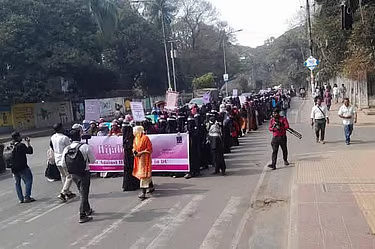In light of Sheikh Hasina seeking asylum in India following her ousting through a popular uprising, a pressing question has emerged since the afternoon of August 5: How will India respond to this sudden change in Bangladesh and what will its reaction be?
Even without Sheikh Hasina seeking refuge in India, these questions would have arisen. However, with her seeking asylum and no immediate possibility of moving to another country from India, these questions have become even more urgent in the past three days, adding a new dimension to the situation. The question being asked is: What decision will India make regarding Hasina?
For over a decade and a half, India has unwaveringly supported the government that established and sustained an autocratic regime. It would be unrealistic to expect Indian policymakers to understand the reasons behind its fall due to public outrage.
In recent years, particularly since mid-2023, Indian policymakers have been clear that Hasina’s rule was not based on popular support. Nonetheless, analysts and policymakers in India, considering their interests, have strived to keep Hasina in power at all costs. This was evident not only before the 2024 elections but also in 2018, when it was clear to Indian authorities that the Awami League had already “severely undermined democratic norms and institutions” and would become an “embarrassing minority in the next parliament” (Pinak Ranjan Chakraborty, Observer Research Foundation, September 9, 2018).
In this context, India has entangled itself in an uneven relationship with Bangladesh through Sheikh Hasina and the Awami League to maintain its commercial and geopolitical interests.
This perspective, I believe, is not merely due to ignorance but largely driven by a sense of national pride. Indian journalists and researchers’ view of Bangladesh seems to be guided more by nationalism than by a lack of knowledge. There is an expectation that Bangladesh and its citizens should remain perpetually grateful for India’s role in its independence, and that only the Awami League and its leader Sheikh Hasina can ensure this gratitude. This sentiment is so deep in India that they fail to recognize that “gratitude is the heaviest cross to bear.”
Hasina’s fall has exposed the futility of their policies and perspectives. However, rather than acknowledging this reality, Indian policymakers and media have adopted a concerning stance, describing Bangladesh’s upheaval as an Islamist uprising.
The August 6 headline of Kolkata’s current newspaper, “Rampage by Jamaat Supporters, Hasina Flees to India, Bangladesh Under Military Control,” seems to reflect not just one newspaper’s stance but a broader sentiment seen in recent discussions on Indian television talk shows and various YouTube broadcasts. The violence, attacks on minorities, and law and order issues in the post-uprising situation are alarming. Yet, the exaggeration in Indian media is even acknowledged by the West Bengal police.
An announcement on social media on August 7 stated, “The way some local TV channels are reporting the current situation in Bangladesh is alarmingly communal and contrary to the guidelines of the Indian Press Council.”
Furthermore, India Today reported on August 6 that this popular uprising in Bangladesh is described as a conspiracy by China and Pakistan. Indian TV program commentators have echoed similar sentiments. There is a long-standing tendency in Indian politics to view all non-Awami League forces in Bangladeshi politics as being supported by the Pakistani ISI.
The Times of India’s editorial on July 21 noted, “The rising public discontent against the Awami League is creating a security crisis for India. What India needs the least right now is a Bangladesh run by a Pakistan-supported government in a post-Awami League scenario; New Delhi should ensure it engages with all sections of Bangladeshi politics to safeguard its strategic interests.”
Both the Indian government and opposition parties hold the same position on the Bangladesh issue. Statements from Foreign Minister Jaishankar on August 6 in the Lok Sabha or Congress leader Rahul Gandhi’s question in an all-party meeting about foreign involvement in the Bangladeshi events make the intention clear. The aim is to question the legitimacy of the new interim government in Bangladesh. Such discussions seem aimed at influencing Western countries.
The portrayal of Bangladesh as having a government supported by an extremist faction could hinder the new government’s efforts, especially in receiving economic aid. This is likely to cause instability within Bangladesh.
India’s approach might encourage a faction of the ousted Awami League to destabilize the country. The video message from Sajeeb Wazed Joy to the leaders and workers who were left behind—“Stand with courage, we are here”—is certainly not a call for peaceful participation in the political process.
It is well known that weapons were used to suppress the student movement by the Chhatra League and Juba leagues during the movement. How these are being used now or could be used in the future is predictable. The Indian government and policymakers are aware of this. The rhetoric and actions indicate that India is using various strategies to align the post-Hasina situation with its interests.
Adding to this is Sheikh Hasina’s presence in India. It is not surprising that Hasina would seek refuge in neighboring India after fleeing Bangladesh. However, the presence of Indian National Security Advisor Ajit Doval at the airport and their discussions indicate that India still regards Hasina as a significant figure and a key player in Bangladeshi politics.
Adding to this is Sheikh Hasina’s presence in India. It is not surprising that Hasina would seek refuge in neighboring India after fleeing Bangladesh. However, the presence of Indian National Security Advisor Ajit Doval at the airport and their discussions indicate that India still regards Hasina as a significant figure and a key player in Bangladeshi politics.
The phenomenon of autocratic leaders seeking refuge in other countries after revolutions, uprisings, or military coups is not new. However, there is no precedent for such figures receiving a formal ‘welcome’ at an airport by a country. This highlights the importance of India’s actions, as evidenced by its refusal to grant asylum to Sri Lanka’s former President Gotabaya Rajapaksa and Afghanistan’s former President Ashraf Ghani.
Sheikh Hasina has not requested asylum from India; rather, the Indian government has stated that it is giving her time to decide. Hasina is seeking refuge in various countries. Western countries are unlikely to offer asylum. The alternative could be Gulf countries, but if there are indirect signals from the U.S., these countries may not be enthusiastic. Nawaz Sharif of Pakistan is not a relevant example in this context.
Hasina’s ousting is not the only issue; her final days in power were marked by extensive violence. A major task for the interim government in Bangladesh will be to bring to justice those who have violated human rights, committed murders, and ordered abductions and disappearances over the past 15 years. In this regard, Bangladesh could request India’s extradition of Hasina under the agreement signed in 2016. However, attempting to prosecute Hasina in Bangladesh could lead to instability and be perceived as vindictive.
Tom Kin of the International Crisis Group has mentioned to BBC reporters that if the International Criminal Court investigates Bangladesh’s recent events and initiates legal proceedings, it would create a different situation. Such a citizen-led initiative from outside Bangladesh had been undertaken before Hasina’s ousting; now the Bangladeshi government could formally initiate this process. Are Indian policymakers considering this?
Ali Riaz
Political Scientist and Professor









